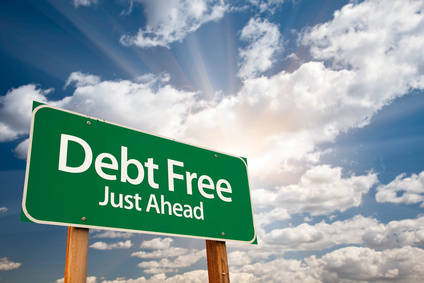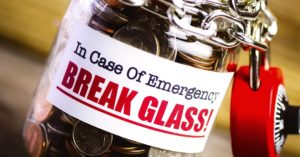What would your life be like if you didn’t have any debt payments? How would your financial picture change if you weren’t tied to those payments month in, month out? Let’s break the cycle and finally get out of debt.

Three years ago, my family had close to $60,000 worth of consumer and student loan debt. I had been in debt since I got my first credit card at 19 years of age and after spending close to 20 years in the debt trap, never thought we could climb out of it.
After feeling fed up and tired of juggling nine different debt payments on top of the rest of our monthly bills, I knew we had to make a change. Using these 5 steps, along with focus and determination, we were able to pay off our consumer debt in 25 months. Here’s how we got out of debt, and you can too.
5 Steps to Debt Freedom
1. Stop Using Debt:
Seems obvious right? If you want to pay off your debt, you have to stop using debt. It’s time to cut up the credit cards or at the very least put them on ice (literally). In order to get out of debt you have to commit to using cash for your purchases from here on out. This means being patient, saving up, and planning your future purchases. If you’ve been relying on debt, this will be the hardest step, but this is the first step in finally freeing yourself from the mountain of bills.
2. Establish your Emergency Fund:
In order to have a bit of a financial cushion between you and life, and cut ties with the credit card or line of credit, you’ll want to make sure you have a starter emergency fund. For most of us $1000 set aside in a separate savings account will cover most emergencies that arise while getting out of debt. You must commit though to keeping this money in case of emergency only (and no, that pair of boots that you’ve had your eye on and have just gone on sale for 75% off are NOT an emergency).
order to have a bit of a financial cushion between you and life, and cut ties with the credit card or line of credit, you’ll want to make sure you have a starter emergency fund. For most of us $1000 set aside in a separate savings account will cover most emergencies that arise while getting out of debt. You must commit though to keeping this money in case of emergency only (and no, that pair of boots that you’ve had your eye on and have just gone on sale for 75% off are NOT an emergency).
3. Get on a Budget and Stick With It:
If you want to get out of debt, changes in how you behave with and manage your money are key. The biggest change you can make that will see the debt gone once and for all is to get on a written monthly budget and stick with it. If you’re new to the budgeting process, this article will help you get started.
4. Organize Your Debts:
Time to take out those debt statements and organize them in the order that you’re going to pay them off. There are two ways to organize your debt. Both work because they force you to focus your attention on one debt at a time, and the power of focus is key. 
Snowball: Organize your debts from the smallest to largest, regardless of interest rate. Pay the minimum payments on all of the debts, except the smallest, and throw every extra penny you can at that debt. Once the smallest one is paid off, you take what you had been putting towards it, plus the minimum payment, and start attacking the second smallest debt. By the end, you’re putting a significant amount of money towards your largest debt, making that disappear faster than you could have thought possible.
Avalanche: A second way you could organize your debts is by using the debt avalanche. In this method you are lining up your debts from the largest interest rate to the smallest interest rate. Like the snowball, you’ll keep making minimum payments on the other debts while you pay off the debt with the largest interest rate first and then keep working your way down the line.
5. Throw Every Extra Dollar at Debt:
In order to get that debt paid off as quickly as possible, you want to make sure that you are throwing every extra penny you can at the debt. This means revisiting the budget and seeing what can be trimmed in the short term so you can free up money to add to your debt payment. It may also mean making some extra income.

Getting out of debt requires making some short-term sacrifices, but they payoff is well worth it. Your paychecks become yours again so that you can save for retirement, help pay for your children’s education, and save up for that vacation you’ve always wanted to go on.
Once you start living a debt-free life, I promise you’ll never go back to using credit again.
You Turn:
- What are you willing to cut from your budget to pay off debt?
- What would you do with your income if you didn’t have debt payments?

Good post. It’s not always simple. I basically went from saving 20% of my paycheck to about 80% of it. It worked! Almost debt free and into the blue!